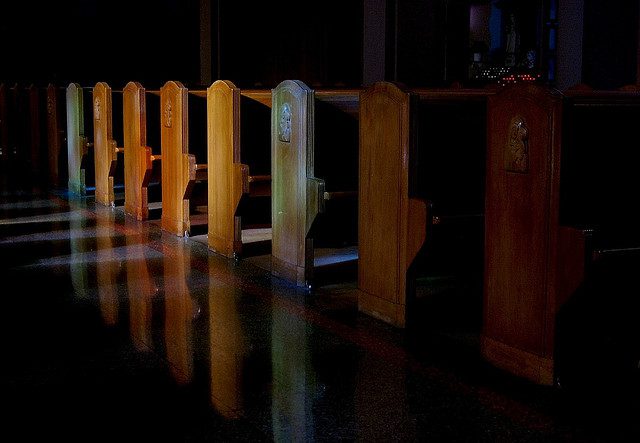Call to Save Worship
This is a portion of a comment I received from an ELCA pastor on my post, “Dear Traditional Worshipers:”
Jesus made it very clear in the great commission what the church is to be about. Go everywhere and make disciples, baptize and teach. Throughout his ministry Jesus was constantly battling with any religious custom or “tradition” that kept people away from God. He physically touched the ritually impure, broke the sacred Sabbath laws, threw over the Temple sanctioned system of money changing, ate with sinners and tax collectors, just to name a few. The church always exists first for those who haven’t found it yet. When the church loses this mission focus it risks becoming what our bishop has called “a country club with a religious flavor”.
The bishop also recently shared some troubling statistics about youth and young adults in the Lutheran Church (which is presumably similar to other mainline denominations). “If we are satisfied with losing 92% of our youth, then let’s not change anything,” the bishop told the synod council. Citing research that found that 84% of Lutherans between confirmation and age 24 do not attend church, and that half of the rest attend non-Lutheran churches, the bishop told the council, “the absence of young people between the ages of 18 and 35 is the single largest challenge facing the Lutheran church in this region.”
Hundreds and hundreds of mainline churches close in the U.S. every year. Many of them are right in the heart of growing communities. Most of the long established congregations in our fast growing county are in decline. Who will be the church leaders twenty and thirty years from now? What are we willing to compromise in order to attract unchurched people so they can experience the church’s relevance in their lives?
A Sermon for the Few and Faithful
I think it is obvious that the word “traditional” reflects a living, breathing, changing thing. Like I’ve said, it’s not good enough to continue something because we like it. But change should be slow, sometimes painfully so, not a knee-jerk response, nor a band-aid to fix the bleeding brought about by a knee-jerk change.
The mega churches say that contemporary worship is the answer. If you can come up with a Christian version of popular entertainment, butts will fill the pews (or the stadium-style seating), and you can bait and switch them with a 21st-century version of the gospel.
But that’s not exactly what seems to be happening. This truth probably comes as a shock to a lot of people, especially those in the booming, commercial McCongregations: contemporary worship is more pervasive than ever, but young people are still leaving the church, and they’re leaving fast.
Yes, you may attract some new people with a contemporary service, but when that service evolves into something altogether different, which is the modus operandi of contemporary worship, those folks aren’t going to stick around and remain good Lutherans (or whatever). They’re going to go to find another entertainment venue close by that offers them what they want. After all, the worship customer is always right. And you didn’t teach them the beauty of the gospel and your liturgical tradition, you taught them to be non-denominational commercial Christian music junkies.
Let’s be clear: I believe we should always be singing new music, and always reflecting the imago dei in us with creativity and artistry.
But changing the way we worship will not save the church.
My own youth was not that long ago. Out of all my friends who have left the church, not one left because they didn’t like the music, nor did they stay because of it. They left because the Church wasn’t a safe place for unbelief. Because tough questions were rebuked as a rebellious attitude or ignored altogether. Because it wasn’t an authentic community. Because it looked too much like the rest of their culture. Because there was no heart behind it. Because it was all about Sunday morning entertainment, and crappy entertainment at that. Because it was busy waging a morality war against Disney and missing the true call of the Gospel.
And frankly, most of them left because they had no desire to continue to conform to an outdated cultural norm that demanded we keep up the appearance of being good, moral people by parking our butts weekly in our regular Sunday pew.
They didn’t believe, and didn’t believe they needed to pretend that they did.
The truth of the matter is, many young people are going to leave the church. The decline will happen. Not really because of worship “style,” but because we live in a culture in which church attendance is not a requirement. It’s time to embrace the decline.
I’m not suggesting we callously write them off, but it’s just reality. The ones who will remain invested are those who have been taught why we do the things we do, who yearn for beauty in the Sanctuary, and who learn to long for the safety of community, and who understand the difference between attracting people and discipling them.
It does look bleak for the mainline, but even the low-church, contemporary-worshiping evangelical denominations are seeing it, too. The Southern Baptist Convention has quietly been in decline for a number of years, and I would expect that to continue with increasing speed. Yes, things look bleak. But, as the hymn says, “Built on a rock the Church shall stand / even when steeples are falling.”
A Repurposed Benediction
Yes, the church exists for people who haven’t found it yet, but worship doesn’t, at least not in the way most churches think. Of course, Word and Sacrament are inherently evangelistic, but that’s not the focus. The elements of Christian worship aren’t mere tools of attraction, they are utter necessities for our mission.
The McCongregation where I grew up didn’t understand this. I remember the pastor saying we had to change our worship services because the historic way “didn’t bring people to Jesus.” Well, he was partially right, but still very, very wrong.
Of course corporate worship doesn’t bring people to Jesus. The gospel brings people to Jesus. The Spirit brings people to Jesus. A church that is nourished by Word and Sacrament brings people to Jesus.
Jesus brings people to Jesus.
Maybe sacred time needs to be repurposed. Maybe instead we reassess how to do worship together. I think that means we ask tough questions.
Are we being true to our Christian identity?
Are Word and Sacrament the substance of our worship?
Are we doing God’s story, or our own?
Are our people doing work or vegging out?
Are we expecting worship to change us dramatically?
Are we resisting the temptation to build silos inside our walls?
Are we open and welcoming to those who don’t look like us, don’t act like us, don’t talk like us, and don’t vote like us?
Are we preaching and proclaiming the gospel together, or settling for easy 3-point self-help lessons with a take home?
Are we open to real, honest questions?
Are we careful not to compromise our substance in the hopes of getting a few more butts in our seats?
Are we allowed to be real with each other, avoiding the temptation to gloss over the crap going on around us with easy, tidy, Jesusy clichés‘?
Are we being lifted out of the mundane and profane of our culture, reminding ourselves who we are and whose we are?
Are we setting aside our compulsive need to be entertained in favor of finding disciplined respite in the beauty of God’s holiness and movement in human history?
The thing is, though the mission of the church lies beyond it’s outer door, what we do inside of it matters. It matters a lot, actually. Maybe we need to hurry back together on Sunday morning as if our lives depended on it, as if the world depended on it. To remind ourselves that we’re not alone, not crazy. To remember who we are through the constant retelling of the Christian story. To bring the lenses through which we view the world back into focus. To worship in a way that molds us into the church that we’re called to be as people of living God,
And then go.
Go out and feed the hungry. Go out and break bread with the broken. Go out and break Sabbath laws. Go out and care for the ritually unclean. Go out and push for peace and justice. Fight for an end to oppression, hunger, and war. Go out and create something beautiful. Go out and act justly and love mercy. Go out and make disciples.
True evangelism happens when the church is missional, going out into a cursed world, not trying to hook it with a production.
Getting butts in the seats is not evangelism. It’s not discipleship.
The church’s relevance in people’s lives will only be renewed when the church goes out into the world at 12 pm on Sunday, and doesn’t come back for a hundred and sixty-seven hours.
If that happened, yes, steeples would fall, but the church would be found where it’s supposed to be all along. Within us, where the Most High surely is dwelling.
Hymn of Repurpose
And now, let us please rise and sing hymn number 365, “Built on a Rock.”
Built on the Rock the Church shall stand
Even when steeples are falling.
Crumbled have spires in ev’ry land;
Bells still are chiming and calling,
Calling the young and old to rest,
But above all the soul distressed,
Longing for rest everlasting.
Surely in temples made with hands
God, the Most High, is not dwelling;
High above earth His temple stands,
All earthly temples excelling.
Yet He who dwells in heav’n above
Chooses to live with us in love,
Making our bodies His temple.
We are God’s house of living stones,
Built for His own habitation.
He through baptismal grace us owns
Heirs of His wondrous salvation.
Were we but two His name to tell,
Yet He would deign with us to dwell,
With all His grace and His favor.
Grant then, O God, Your will be done,
That, when the church bells are ringing,
Many in saving faith may come
Where Christ His message is bringing:
“I know mine own, My own know Me,
You, not the world, My face shall see.
My peace I leave with you. Amen.”














